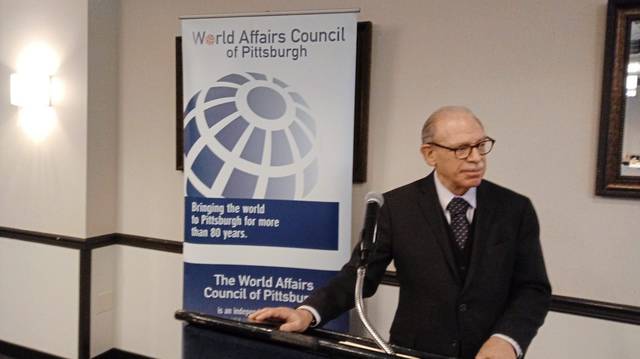Former U.S. Ambassador to Yemen Gerald Feierstein spent over four decades traveling around the world. His nine overseas postings included three tours of duty in Pakistan, as well as assignments in Saudi Arabia, Oman, Lebanon, Israel and Tunisia.
But when Feierstein addressed an audience of 100 people at a World Affairs Council of Pittsburgh luncheon at the Rivers Club on Tuesday, one of the first things he mentioned was his fondness for traveling to Forbes Field when he was a student at Point Park University in the late 1960s. “I grew up in Philadelphia as a loyal fan of the Phillies and the Eagles, but going to Forbes Field and seeing Roberto Clemente and Willie Stargell playing ball was quite an experience,” he said.
Feierstein returned to Pittsburgh for the first time since graduating from Point Park and then earning his master’s from Duquesne University in 1975. What followed was a 41-year career in the U.S. Foreign Service, in which he achieved the personal rank of Career Minister.
After serving as ambassador to Yemen from 2010 to 2013, Feierstein was principal deputy assistant secretary of state for Near Eastern affairs. He retired from the Foreign Service in 2016 and is now free to speak his mind about what he sees as a crisis in U.S. Middle East policy.
“The United States is in its weakest position in the Middle East region, at least since 1979” — when the Iran hostage crisis began — “and quite possibly the weakest position that it’s ever been in,” he said.
Feierstein stated that the decline in U.S. influence in the Middle East did not begin with the Trump administration. “But the downward spiral has undoubtedly accelerated over the past three years,” he said, citing missteps that have deepened regional doubts about U.S. commitment. Russia and China have both moved aggressively to fill the vacuum.
The missteps, he said, include the Trump administration’s inability to formulate a long-term strategy to eliminate violent extremism in the Middle East.
“There’s no mistaking that the successful operation to eliminate [ISIS leader] Abu Bakr al-Baghdadi was an important tactical blow against the Islamic State. But it did not eliminate the organization or make it less potent,” he said.
“Prospects for the Trump administration’s success or reported goal of eliminating violent extremism are unpromising, given the administration’s resistance to programs designed to address the underlying causes of violent extremism. The likelihood is that we will soon face new threats and the rise of Islamic State 2.0”
Feierstein said Trump’s “disastrous” handling of the situation in Northern Syria and his “abdication of moral authority,” including abandoning the partnership with Kurds, will only deepen anxieties about U.S. reliability in the region.
But he acknowledged that the inability of the U.S. to formulate a coherent policy on Syria long predates Trump.
“From the demands in 2011 that Bashar Assad step down in the face of peaceful protests to the failure to respond to Syrian violations of his own self-imposed red line on chemical weapons use, Barack Obama’s uneven approach to Syria similarly confused our regional partners,” said Feierstein. “But despite Obama’s shortcomings with regard to Syria policy, there was consistency in his decision-making.”
Feierstein was even more critical of Trump’s Iran policy, citing the administration’s attempts to force Iran to negotiate a new agreement to improve on the abandoned nuclear deal.
“Eighteen months into the administration’s maximum pressure campaign, it’s reasonably safe to say that the initiative is in a shambles,” said Feierstein.
Feierstein pointed out the series of increasingly provocative actions that amounted to the Iranians thumbing their noses at the U.S. They include attacking oil tankers and pipelines both inside and outside the Strait of Hormuz, shooting down a U.S. surveillance drone and most recently attacking Saudi Arabia’s oil facilities.
“The lack of any substantial U.S. response to these acts of aggression has undoubtedly emboldened the Iranians and demoralized our partners.”
Looking forward, Feierstein recommends reengaging with Iran with a goal of reducing tensions and ending the threat of regional conflict.
“To be blunt, it’s not clear to me that any of these steps are likely to occur through the remaining time of the Trump administration,” said Feierstein. “But the alternative is the current trajectory of decline in U.S. power and influence in the region. Whether a new administration in a post-Trump era would be able to reduce that trend is uncertain.”








